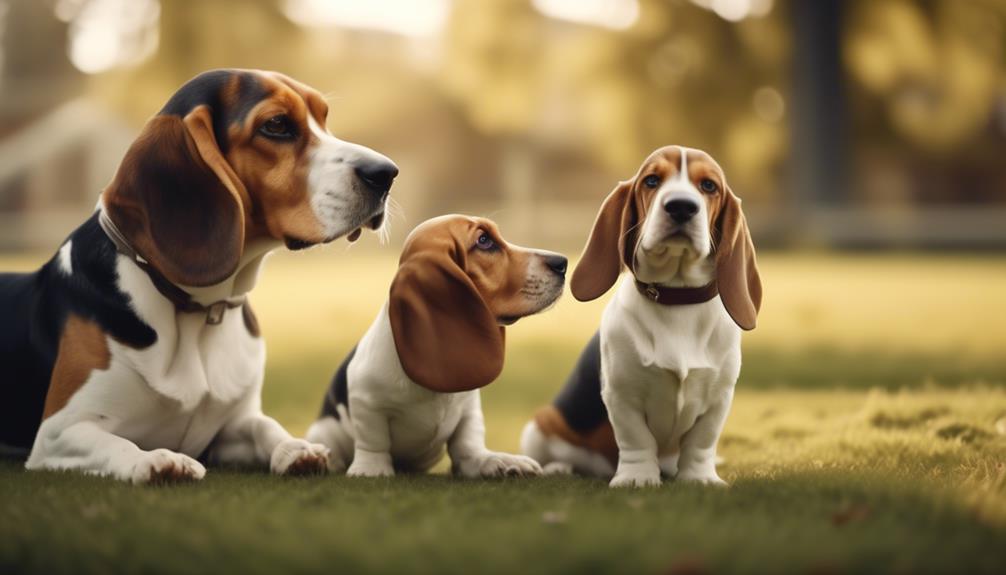How to Decide Between a Beagle and a Basset Hound for Hunting

When deciding between a Beagle and a Basset Hound for hunting, there are several factors to consider.
Firstly, their size plays a significant role in their hunting capabilities. Beagles are smaller and lighter, which makes them more agile and able to navigate through various terrains. On the other hand, Basset Hounds are larger and heavier, which gives them a stronger presence and ability to track larger game.
Secondly, their physical attributes should be taken into account. Beagles have a keen sense of smell and excellent endurance, allowing them to track scents for long distances. Basset Hounds, on the other hand, have a superior sense of smell and a sturdy build, which helps them stay on the trail even in difficult conditions.
Thirdly, their hunting instincts differ slightly. Beagles are known to be more independent and have a strong prey drive, making them eager hunters. Basset Hounds, on the other hand, have a more laid-back and patient approach to hunting, making them better suited for slower-paced pursuits.
Lastly, training requirements should also be considered. Beagles are generally easier to train due to their intelligence and willingness to please their owners. Basset Hounds, on the other hand, can be more stubborn and independent, requiring a patient and consistent approach to training.
By considering these factors – size, physical attributes, hunting instincts, and training requirements – you can make an informed decision between a Beagle and a Basset Hound for hunting.
Key Takeaways
- Beagles are smaller and lighter, making them better suited for navigating various terrains while Basset Hounds are larger and heavier, giving them a stronger presence and ability to track larger game.
- Both Beagles and Basset Hounds have strong hunting instincts and excel in scent work, but Beagles are more suited for hunting smaller game like rabbits while Basset Hounds are better suited for trailing larger game such as deer or boar.
- Beagles are generally easier to train due to their intelligence, while Basset Hounds can be more stubborn and independent, requiring a patient approach to training.
- Beagles have high energy levels and require plenty of exercise, making them great companions for active individuals or families, while Basset Hounds have a more relaxed and laid-back personality, making them a better fit for individuals or families who prefer a calmer companion.
Size and Physical Attributes
When considering the size and physical attributes of both the Beagle and the Basset Hound for hunting purposes, it's important to take into account their distinct characteristics.
The Beagle is a small to medium-sized breed, typically weighing between 20 to 30 pounds. They've a well-muscled body and a compact build, allowing them to navigate through various terrains with ease. Their short and sturdy legs provide them with agility and speed, making them excellent hunters.
On the other hand, the Basset Hound is a larger breed, weighing between 40 to 65 pounds. They've a long and low-set body, with short and stout legs. This unique physical structure allows them to follow scents close to the ground, making them particularly skilled at tracking game.
Additionally, both breeds possess distinct features that aid in their hunting abilities. The Beagle has long, droopy ears that help trap scents and direct them towards their nose. Meanwhile, the Basset Hound's long ears serve a similar purpose, effectively sweeping scents upwards towards their nose.
These physical attributes make both breeds well-suited for hunting, each with their own advantages and attributes.
Hunting Instincts and Abilities

The strong hunting instincts and exceptional scenting abilities of both Beagles and Basset Hounds make them valuable assets in tracking and chasing game. Here are some key points to consider when deciding between these two breeds for hunting:
- Hunting Instincts: Beagles and Basset Hounds are both bred for hunting purposes and possess strong hunting instincts. They've a natural drive to track and pursue game, making them reliable companions in the field.
- Scenting Abilities: Both breeds excel in scent work and have impressive scenting abilities. Beagles are known for their acute sense of smell and can easily pick up and follow even the faintest of scents. Basset Hounds, on the other hand, have an extraordinary sense of smell due to their long ears and large nostrils, which help capture and detect smells more effectively.
- Game Preference: Beagles are more suited for hunting smaller game like rabbits due to their agility and speed. They can quickly maneuver through dense terrain and keep up with fast-moving prey. Basset Hounds, with their strong noses and endurance, are better suited for trailing larger game such as deer or boar.
- Versatility: Both Beagles and Basset Hounds are versatile hunting companions. Apart from traditional hunting activities, they can also be trained for scent work, tracking trials, and various hunting sports, providing entertainment and fulfillment for both the dogs and their owners.
Considering these hunting instincts and abilities can help you make an informed decision when choosing between a Beagle and a Basset Hound as your hunting companion.
Training Requirements and Ease of Training

Training requirements and ease of training vary for both Beagles and Basset Hounds due to their independent nature and unique characteristics. Both breeds can be stubborn, making training a challenge. Beagles are known for their intelligence, which can work in their favor during training. However, their stubborn streak may also make them resistant to commands at times.
On the other hand, Basset Hounds are intelligent but may be harder to train due to their independent thinking. When training both breeds, positive reinforcement methods work best. Consistency, patience, and early training are important for both Beagles and Basset Hounds. It's crucial to establish clear boundaries and rules from the beginning to ensure they understand what's expected of them.
One consideration when training a Basset Hound is their short legs and long ears. These unique physical characteristics can sometimes affect their ability to follow commands, especially when it comes to scent tracking during hunting. It's important to be mindful of these limitations and adapt training methods accordingly.
Energy Levels and Exercise Needs

Considering their energy levels and exercise needs, it's important to understand the contrasting characteristics of Beagles and Basset Hounds. Here are some key points to help you decide between the two breeds for hunting:
1) Beagles: Beagles are known for their high energy levels. They require plenty of exercise to stay healthy and happy. They love to play and explore with their owners, making activities like fetch, long walks, and jogs ideal for them. Their energetic nature makes them great companions for active individuals or families who've the time and energy to keep up with their exercise needs.
2) Basset Hounds: In contrast to Beagles, Basset Hounds have a more relaxed and laid-back personality. They aren't as energetic and prefer slower activities. While they still need regular exercise to maintain their overall health, they may not require as much vigorous exercise as Beagles. Basset Hounds may be a better fit for individuals or families who prefer a calmer and more low-key hunting companion.
When deciding between a Beagle and a Basset Hound for hunting, understanding their energy levels and exercise needs is crucial. It's important to choose a breed that aligns with your own lifestyle and preferences. By considering these factors, you can make an informed decision and choose a breed that's contextually relevant to your hunting goals and personal circumstances.
Noise Levels and Barking Tendencies

When it comes to noise levels and barking tendencies, both Beagles and Basset Hounds have distinct characteristics that should be taken into consideration. While both breeds are known for their hunting abilities, they also make great family pets. However, their noise levels and barking tendencies can vary.
| Breed | Noise Levels | Barking Tendencies |
|---|---|---|
| Beagle | Moderate | High |
| Basset Hound | Moderate | Low |
Beagles are known for their loud, deep barks that can carry over long distances. They have a natural instinct to bark when they sense danger or when they are excited. On the other hand, Basset Hounds are relatively quiet dogs with low barking tendencies. They are more likely to howl or bay rather than bark.
When deciding between a Beagle and a Basset Hound for hunting, it is important to consider the noise levels and barking tendencies of each breed. If you prefer a quieter hunting dog, the Basset Hound may be the better choice. However, if you are willing to tolerate a more vocal dog, the Beagle's barking tendencies may not be an issue.
It is also important to note that excessive barking can be a sign of underlying health conditions or behavioral issues. Regular exercise, training, and socialization can help manage and control barking tendencies in both breeds.
Temperament and Compatibility With Other Pets

Both Beagles and Basset Hounds, known for their distinct noise levels and barking tendencies, also have friendly temperaments and can be compatible with other pets. Here are some important considerations regarding their temperament and compatibility with other pets:
- Friendly nature: Both Beagles and Basset Hounds have a friendly disposition, making them great companions for families with children. They're generally good with other dogs too, due to their pack animal nature. However, proper socialization is key to ensure positive interactions.
- Hunting instincts: Beagles and Basset Hounds have a strong prey drive and may instinctively chase small household pets, such as cats, rabbits, or rodents. It's important to supervise interactions and provide proper training to discourage chasing behavior.
- Exercise needs: While Basset Hounds may appear lazy, they still require regular exercise to stay healthy and mentally stimulated. Beagles, on the other hand, are known for their energy and may need more exercise to prevent boredom and behavioral issues.
- Pack mentality: Both breeds mature at a similar rate and have a pack mentality. This can make them more compatible with other pets, as they're accustomed to living in a social environment. However, introductions should be done gradually and under supervision to ensure a smooth transition.
Considering these factors, it's important to assess your own pet's temperament, exercise needs, and the dynamics of your household before deciding between a Beagle and a Basset Hound for hunting.
Health Considerations and Potential Breed-Specific Issues

Beagles and Basset Hounds are both prone to specific health issues that potential owners should be aware of. When considering which breed to choose for hunting, it's important to take into account the health considerations and potential breed-specific issues that each breed may face.
Both Beagles and Basset Hounds have their own set of health concerns. Beagles may be prone to epilepsy, allergies, and eye issues. On the other hand, Basset Hounds may have health issues such as osteochondrosis, bloat, and hip dysplasia. It's crucial to be aware of these conditions and take appropriate measures to address them.
Neurological issues can affect both breeds, and cancer is a leading cause of death in both Beagles and Basset Hounds. Regular check-ups and preventative measures can help in detecting and managing these conditions.
Basset Hounds, with their long ears and wrinkled skin, are more likely to suffer from ear infections and skin-related conditions. Regular cleaning and drying of their ears and skin can help reduce the likelihood of infection or irritation.
Beagles have a reduced number of health conditions compared to Basset Hounds and tend to have a longer lifespan. They require plenty of exercises to stay healthy due to their energetic nature. On the other hand, Basset Hounds have a more relaxed and laid-back personality, requiring slow activities. It's important to consider these factors when deciding which breed is best suited for hunting.
Frequently Asked Questions
Should I Get a Beagle or a Basset Hound?
When deciding between a Beagle and a Basset Hound, it's important to consider their hunting instincts, temperament differences, size considerations, training requirements, energy levels, scenting abilities, compatibility with other pets, health concerns, grooming needs, and exercise requirements.
Are Basset Hounds Good for Hunting?
Basset hounds possess excellent hunting instincts due to their strong sense of smell. However, when deciding between a beagle and a basset hound for hunting, one should consider factors such as training methods, hunting environments, and the specific hunting techniques each breed excels at.
Are Beagles Good Hunters?
Beagles are excellent hunters, thanks to their strong sense of smell and agility. Their friendly temperament and intelligence make them great hunting companions. Training can be challenging due to their stubbornness, but they excel in tracking and are suitable for various hunting terrains.
Do Basset Hounds Get Along With Beagles?
Basset Hounds generally get along well with Beagles, but proper training and socialization are important. Both breeds have common behavioral issues, require exercise, and have specific health concerns. Differences in size, appearance, and temperament should be considered when choosing.









